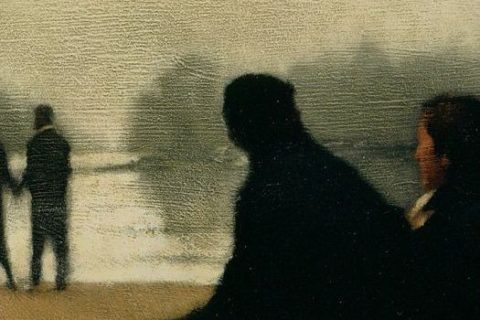I’m not a treehugger. I hate pretentious, granola bar eatin’ hippies from Vermont; they have terrible style on top of their loathsome personalities. What kind of philistine wears socks with sandals? At Identity Dixie, we subscribe to the Merle Haggard tradition: “Leather boots are still in style for manly footwear. Beads and Roman sandals won’t be seen.” At this point, I’d take a hippie over a hipster, but we’re getting off track.
The purpose of this entry of Don Colacho posting is to smash the machines and save the Southern Shire. We’re luddites around these parts, despite using social media apparatuses to create an “evil Neo-Confederate” propoganda empire. You work with what you’ve got. Sending smoke signals won’t save Dixie, sadly. Ultimately, we promote agrarianism, along with other supposedly archaic views, disreputable ideologies, and primitive philosophies. “Subdivisions are named after what they destroy” is one of our more popular meme templates for a reason.
Let’s begin.
Natural disasters devastate a region less effectively than the alliance of greed and technology.
Escolios a un Texto Implícito: Selección, p. 362
Zoomers and some millennials may not remember the 1993 “Storm of the Century” which gripped much of the South, and the East Coast, in a wintry vice. Whole areas of the country were covered in truly massive amounts of record breaking snow, power outages lasted for extended periods, and families had to bundle together for heat, water and basic survival with the loss of civilizational securities. In the end, several hundred fatalities occurred during the ordeal. Anyone who lived through it still remembers the storm or comments on it when a blizzard is on the forecast – “It’ll never be as bad as the ‘Storm of the Century’.“
However, the storm didn’t bring lasting devastation to the region. The snows melted, powerlines were restored, the farms and forests of the South recovered. The same can’t be said of our neverending deforestation and urban (and suburban) sprawl. Tear down the ancient cedar trees, pave over the family farms, damn the rivers and dry the meandering creeks. After all, we need a new Walmart or Starbucks within every 10 mile radius. This progressive society needs bland suburbs with their half acre lots and half a million price tags.
The mastery which man has gained over nature only helps him to debase it without fear.
Escolios a un Texto Implícito: Selección, p. 259
Modern man doesn’t fear nature because he is ignorant of it. His ancestors partially tamed it. But, even the near-past man, well before the smartphone and vehicle-installed GPS system, knew to be fearful of it. It was understood that something was in the woods – be it a misplaced compass, broken bones or an animal that had the food chain leveled through your misfortune.
Like God, nature has no respect from modern man. Our ancestors were fearful of both the Lord and the wilderness outside their doorstep. They sensed that there was something more powerful than themselves awaiting them, it was wise to take caution. For instance, a woman attempting to visit the abandoned bus made famous by the book and film Into The Wild died earlier this year. The newlywed woman, one of many tourists who attempt to visit the “Magic Bus” where Chris McCandless died in 1992, drowned attempting to cross a river to get to the vehicle. I don’t flippantly comment on anyone’s death, but she didn’t fear nature enough.
The technician speaks to the layman like an insolent sorcerer.
Escolios a un Texto Implícito: Selección, p. 350
Information Technology (IT) personnel have a rather nasty reputation within both public and private sectors of the American economy. Unfortunately, it’s a well deserved and commonly held opinion, as practically anyone who works with such people can attest. It boils down to this, that the “technician,” the expert in technological hardware and software systems, is both incredibly antisocial and awkward, but also annoyingly haughty. In his mind, you are a fool for simply asking about something that is plainly complex or convoluted. This behavior is compounded by the fact that the technician feels slighted as he views the inquiry as an indictment on his own creativity and stewardship.
The technician cannot, generally speaking, communicate in plain and direct language. His language is comprised in lines of code, binary procedures, elaborate methods, nonsensical acronyms and inane knowledge. There is no consistency to their mastery, as their religion fluctuates frequently based on the whims of wonkish fellow warlocks. To observe or question this is to be labeled a rube or Neanderthal. Typically, the technician will never independently lead any corporation or organization, just as the court wizard could never be king.
God invented tools, the devil machines.
Escolios a un Texto Implícito: Selección, p. 226
The telephone was designed for communication. It, like all tools, was created for us to complete a task. “Task” doesn’t imply something arduous either. Some tasks are enjoyable, like having a pleasurable conversation with a longtime friend. However, the telephone tool of our grandfathers has turned into something far more insidious – a machine that, in tandem with the other devilry of modernity, is now facilitating vice never before witnessed. The “smart” phone provides effortless access to pornography, degeneracy, gambling, gossiping, addiction, sleep deprivation and an endless list of moral degradation. It is no longer a tool, but a machine of something far more darker.
Conversely, the machine removes, more or less, man’s dominion over his own talent, expertise and skill. The machine replaces man – it replaces his hard work and sense of achievement with cold pragmatism. Thus, the machine will never be human, it is sterile and rational and also deceptive. Its deception is separating man from the challenges and struggles of life, and the fullness of it, with checkboxes and spreadsheets.
Deo Vindice

The man who never was.


